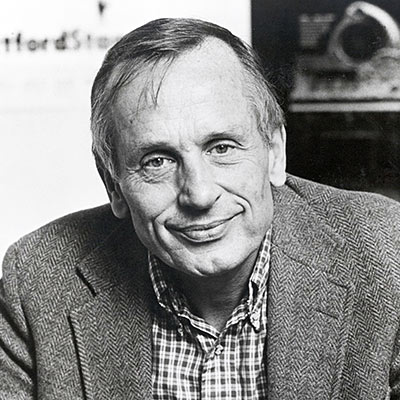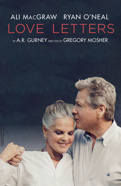Signed, Sealed, Delivered: The Story of A.R. Gurney’s Love Letters, From the Library to the Great White Way
New York City is falling head over heels for A.R. Gurney’s Love Letters, the story of a 50-year correspondence between Melissa Gardner and her childhood-friend-turned-love-interest, Andrew Makepeace Ladd III. Thanks to its simple staging, Gurney’s play, a Pulitzer Prize finalist, has been performed in theater spaces all over the world, from the New York Public Library to Broadway to Carnegie Hall and back again. Put away your iPhone (at least for a minute!) to find out how a touching romance through old-fashioned pen and paper will officially blossom on Broadway beginning September 17, 2014.

A.R. Gurney was sick of theater
When playwright A.R. Gurney set out to create Love Letters, he initially intended to write a book. “I was thinking, ‘Hell, I’ve had enough of theater for a while,” Gurney told Bomb Magazine. “I sent [Love Letters] to The New Yorker. They sent it right back and said, 'We don’t publish plays.’” Taking the magazine’s advice, Gurney decided to try rewriting it as a two-person play, where both actors read letters back and forth to one another. In the late '80s, he was finally ready to perform the piece in front of an audience—but he needed a venue and a leading lady.

It premiered at a library
Gurney was scheduled to give a speech at the New York Public Library—but instead, armed with his friend and collaborator, actress Holland Taylor and a stack of letters, the pair read Love Letters to the crowd. “We started at 4:00, and I put in an arbitrary intermission at 5:00, saying, ‘Well, I’m sure a lot of you have to go,’” Gurney recalled. “And nobody wanted to leave! So I figured we had something.”

Love moved to New Haven
John Tillinger, literary consultant for the Long Wharf Theatre, fell in love with the play and offered to direct the premiere at the New Haven, CT theater company. “'It's theater down to its most simple level, the spoken word,'' Tillinger told The New York Times. His vision for the production included two rules: “[The actors] must not look at each other...And they must not memorize; they must read each letter. This play is not about acting it out.” Love Letters opened in 1988, starring Tony winner John Rubinstein (Pippin, Children of a Lesser God) as Andrew and Joanna Gleason (who had recently won a Tony Award for her performance in Into the Woods) as Melissa.

Next stop, New York City
After positive reviews in New England, Gurney and Tillinger teamed up to bring Love Letters to New York City—but instead of finding an empty house, they went after off-Broadway’s Promenade Theatre, which already had a production of Gurney’s The Cocktail Hour playing. Gurney recalled, “I told the producers of The Cocktail Hour, ‘Look, you’re paying for this theater. How about on Monday night putting in Love Letters?’” The idea worked, and Love Letters opened March 27, 1989, featuring Oscar nominee Kathleen Turner (Body Heat) and Rubinstein reprising his role. The run was so successful, Love Letters eventually became a full-scale production, playing eight times a week.

Celebrities flocked to the show
As word spread about the simple, haunting and emotional off-Broadway show, more A-listers wanted in on the action. “I was at a party and Elaine Stritch came up to me and said, ‘I want to do your blankety-blank play,'” Gurney told Blouin Artinfo. “I didn’t want to tell her she was too old, so I said, ‘Well, who would you get to play it?’ And she said, ‘I’ve already gotten somebody. Jason Robards.’” More than 50 actors of all ages signed on for limited engagements of Love Letters, including Stockard Channing, Swoosie Kurtz, Christopher Walken, Edward Hermann, Joan Van Ark, Christopher Reeve, John Clark and Joseph Sommer.

The Great White Way beckoned
The production was so popular, it transferred to Broadway’s Edison Theatre on October 31, 1989—the first week featured Robards with Colleen Dewhurst. “[It was] after they threw that nudie show [Oh! Calcutta!] out of there,” Robards explained in Colleen Dewhurst: Her Autobiography. “It took more time to wash the sh*t off the walls than it did to put up the set.” He also noted that something seemed strange about his co-star: “I knew that something was wrong with Colleen, but no one wanted to talk about it,” Robards said. Dewhurst later announced she had cervical cancer. She refused surgical treatment and died a year later.

Love spread across the world
After 96 performances on Broadway, Love Letters closed on January 21, 1990—but the love affair wasn’t over. From local actors to Alec Baldwin, everyone wanted to perform the sweet and heartbreaking play. Engagements mounted with Sigourney Weaver and Jeff Daniels (2007), Charlton Heston and Jean Simmons (1991), Elizabeth Taylor and James Earl Jones (2007) and The Daily Show’s Samantha Bee and Jason Jones (2010). The play was adapted into Urdu and Indian in 1992 and toured throughout Europe, the United States and Pakistan.

TV was a rocky road
A decade after premiering on Broadway, the film rights to Love Letters were purchased by producer Martin Starger. Although at first, Gurney didn’t think a play featuring two actors sitting next to one another at desks would translate to film, he agreed to pen a draft of the screenplay—but Columbia, who initially expressed interest, dropped the project. Universal scooped up the script and requested two more rewrites, this time without Gurney. The film eventually sold to ABC and aired on April 12, 1999, featuring Laura Linney and Stephen Weber. The fully realized TV adaptation included costumes, sets and additional characters. "Gurney has ingeniously altered this tender, sentimental drama to fit the new medum," said Variety.

A new Letter begins
In the age of instant communication, iPhones and Twitter, Love Letters is bringing memories of a simpler time to Broadway in 2014, helmed by Tony-winning director Gregory Mosher. The limited engagement includes appearances by Carol Burnett, Alan Alda, Candice Bergen, Stacy Keach, Diana Rigg, Anjelica Huston and Martin Sheen. The first celebrity pair in the new revival is Mia Farrow and Brian Dennehy, who will reprise the role of Andrew. “[Love Letters] is an extraordinary piece,” Dennehy told Today. “You cannot stage a play more simply than this, and yet it’s about everything in life. First love, loss of opportunities, loss of life, loss of love...It’s a beautiful play, and all you do is speak it.” But there’s two things the play won’t include: “Tweets and twerks," Dennehy joked. "There are no twerks in this play.”
